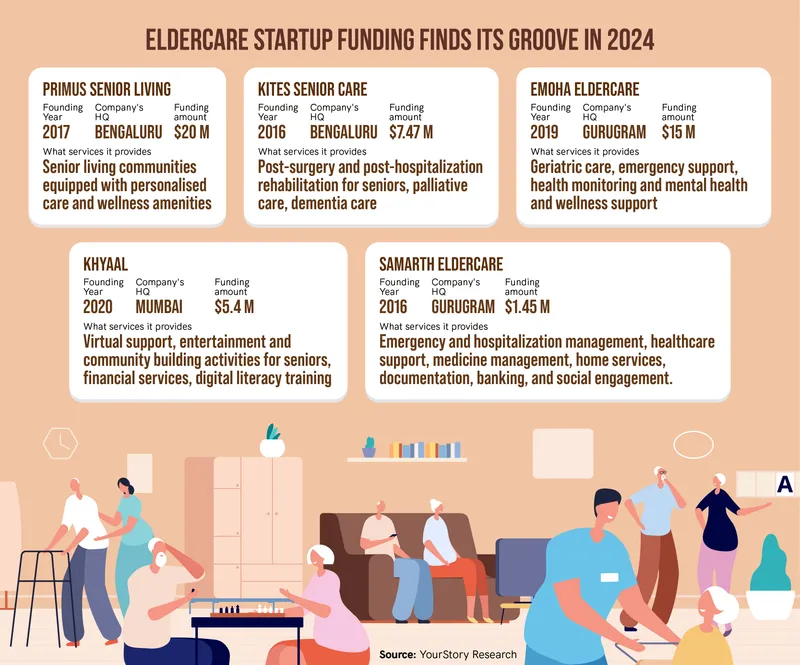When 65-year-old Ramesh Nair (name changed) retired after four decades of working in the corporate sector, he faced a dilemma familiar to many seniors in India: how to make the most of his newfound time while staying engaged and secure. Initially, he considered moving in with his son’s family in Mumbai, but the city’s fast-paced lifestyle and space constraints posed challenges.
That’s when he discovered Primus Reflection, a senior living community in Bengaluru, which promised not just a place to live but an environment to thrive. “I wanted to maintain my independence while being part of a vibrant community. Primus offered me everything I needed—modern facilities, healthcare support, and a sense of belonging,” says Ramesh.
Primus Life, which owns a chain of senior living communities, exemplifies the growing trend of startups and new entrants making their way into the elder care segment in India. The startup is rapidly expanding, with over 2,000 senior homes under development and recent market entry into Mumbai.
In March 2024, Primus raised $20 million in a seed funding round led by General Catalyst, with participation from investors like Nikhil Kamath, Co-founder of Zerodha, and Gruhas, the investment firm co-founded by Kamath and Abhijeet Pai.
Active ageing: A new era of elder care
India’s elder care sector is on the brink of a transformation, driven by technology, investment, and a shift in societal attitudes towards ageing. Startups are not just focusing on the medical needs of the elderly but are also promoting active, independent lifestyles.
With the country’s elderly population set to reach over 319 million by 2050 according to the Longitudinal Ageing Study of India (LASI), this demographic shift is driving a surge of innovation and entrepreneurial opportunity in the elder care sector.
As the landscape continues to evolve, these innovations are setting the stage for a new era in elder care, redefining what it means to age gracefully in India.
Startups like KITES Senior Care are offering a comprehensive range of eldercare services designed to address the diverse needs of seniors. These include post-hospitalisation care, rehabilitation services, dementia care, palliative care, and respite care. Each service is delivered through individualised care plans, tailored to the medical, psychological, and social requirements of every senior.
“With an ageing population and evolving family structures, there is a rising demand for personalised, professional eldercare services that cater to both physical and emotional well-being,” says Dr Reema Nadig, Director and Group COO of Columbia Pacific Communities, Seniorshield, and KITES Senior Care.
There is also a rising demand for holistic wellness programs that blend physical rehabilitation with emotional and social engagement, creating a more comprehensive care approach,” she adds.
In March 2024, the startup had raised Rs 65 crore in a Series A round led by Dr Ranjan Pai’s Manipal Education and Medical Group (MEMG) Family Office Fund.
Adarsh Narahari, Founder and Managing Director of Primus, highlights a significant shift in India’s elder care sector towards “active ageing”. Unlike traditional elder care, which focuses on dependency and managing medical needs, active ageing promotes independence and fulfilment for seniors well into their 70s and 80s.
“I believe that intergenerational housing where all age groups can reside together, yet independently, will become the norm as families become more nuclear. The quality of services and standard of operators will be the key differentiators going forward,” says Narahari.
The sector is also seen as a potential hotspot for retirement migration, attracting retirees both locally and globally due to India’s rich culture, hospitality, and diverse landscapes. Entrepreneur Nikhil Kamath sees immense potential yet to be harnessed in the sector: “The elder care space could be a huge entrepreneurial opportunity. Startups like Primus are creating solutions that provide care, comfort, and dignity for our ageing population.”

Graphic: Nihar Apte
Leveraging technology for senior care
Technology is also playing a pivotal role in transforming elder care services. Startups like Samarth Care are integrating technology with a human touch to bridge the digital divide among seniors.
“Our care app provides a comprehensive view of elderly parents’ wellness for their families, combining web, mobile, and cloud technologies,” explains Asheesh Gupta, Founder of Samarth. “We use AI and LLM (Large Language Models) for predictive analyses, ensuring our services are tailored to the needs of the elderly.”
Gupta recalls an instance where a client—Mrs Sethi, an octogenarian in Gurugram whose children live in the US—had an emergency. Samarth’s technology and app made sure that she was able to raise an SoS, which the startup’s 24×7 emergency team immediately responded to. She got to the ER within 20 minutes, all her relevant records were available to the emergency doctor in the app, and her children were on top of the situation every minute.
In another instance, a client in Mumbai was generally healthy and their children had no inkling about any problem. However an AI-driven analysis of the visit and call reports from Samarth’s care counsellors over time showed a progressive reduction in engagement with others. Based on this, a consultation with a clinician showed early signs of depression, which could be treated.
Similarly, Emoha Eldercare uses IoT and remote health monitoring to connect seniors with healthcare providers, facilitating timely medical interventions. Co-founder Saumyajit Roy emphasises the importance of tech-enabled solutions in ensuring proactive care: “Emoha has saved around 1,000 senior lives in the past five years, reaching over 100,000 users across 120 cities.”
Emoha has partnered with several organisations, including Aditya Birla Health Insurance which offers a bundle with Emoha’s services within its Group Mediclaim products for corporate clients. The startup also offers a preventative monitoring service, GoSecure, which provides seniors with an option to have panic alarm and safety monitoring capabilities with over 15,000 ambulances.
“Through our alliance with IndusInd Bank, we have an innovative Indus Cares product which bundles Emoha’s emotional wellbeing offerings for the bank’s senior citizens,” explains Roy.
Khyaal, another innovator in this space, has built a vibrant community of over 2 million registered senior citizens across Tier I and Tier II cities. “We expect to see more financial products and services tailored to seniors, driven by increasing digital literacy and the adoption of AI,” says Hemanshu Jain, Founder & CEO of Khyaal.
Khyaal’s offerings include digital literacy training, entertainment content, and interactive sessions to combat loneliness. The platform provides financial services through its Khyaal Card, a senior-focused smart payment card, and innovative financial solutions including Khyaal Digi-Gold in partnership with CaratLane, allowing seniors to invest in digital gold securely from their homes.
They also offer comprehensive on-demand assistance services including cab bookings, travel arrangements, medical services, and bill payments, along with curated budget-friendly travel experiences designed specifically for seniors.
Future of elder care: A holistic approach
The elder care sector in India is attracting significant attention from investors. According to Tracxn, Indian elder care startups raised $22.5 million in funding by October 2024, up from $19.1 million in 2023. This influx of capital is enabling startups to scale their operations, develop new-age solutions, and enhance service quality.
Abhijeet Pai of Gruhas, which has invested in startups like Age Care Labs and Primus Senior Living, believes that the elder care space offers immense potential for innovation. “The opportunity lies in creating a balance between modern healthcare infrastructure and fostering a sense of community.
There’s a growing market for elder-focused products, such as AI-driven healthcare monitoring and digital communication tools.”
As the global population ages, the demand for high-quality elderly care has become increasingly urgent. With younger generations becoming more mobile in pursuing education and careers abroad, traditional family-based elder care is evolving.
This shift presents an opportunity for developing alternative care models, such as assisted living communities, independent living facilities, and technology-driven healthcare systems.
Startups are stepping in to address the unique challenges faced by ageing individuals, reshaping the future of elderly care through technology, personalised services, and community-driven solutions.
Priya Mohan from General Catalyst emphasises the need for a fully integrated, full-stack model in elder care: “We are committed to enhancing the quality and longevity of life for seniors. This is the time to build businesses that deliver value across health, home, and personal finance.”
This does come with its own challenges. Khyaal’s Hemanshu Jain noted that a significant challenge lies in building trust and awareness around digital solutions for seniors. “Our experience shows that while seniors are eager to embrace technology that enhances their independence, we must constantly innovate to create interfaces and services that are easy to use, that resonate with their needs while ensuring robust security measures,” he adds.
Primus’ Narahari states that in 2024, the demand for senior living units in India is projected to be between 4 to 6 lakh units, while the current supply is limited to just around 20,000 units.
“This stark imbalance highlights a significant opportunity for growth in the sector. At the same time, we are witnessing a surge in luxury senior living apartments, catering to the growing aspirations of older adults who desire comfort and independence.”










